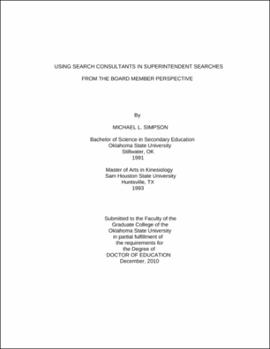| dc.contributor.advisor | Krumm, Bernita | |
| dc.contributor.author | Simpson, Michael L. | |
| dc.date.accessioned | 2013-11-26T08:34:53Z | |
| dc.date.available | 2013-11-26T08:34:53Z | |
| dc.date.issued | 2010-12 | |
| dc.identifier.uri | https://hdl.handle.net/11244/7572 | |
| dc.description.abstract | Scope and Method of Study: Qualitative research to collect data from two sources: 1) Face-to-face interviews with school board members representing four Oklahoma School Districts; 2) Newspaper articles. | |
| dc.description.abstract | Findings and Conclusions: Data from the study indicate that time availability and personnel expertise are determining factors in the decision to select a search consultant. The consultant advised each board about issues of employment law and appropriate interviewing practices. Despite the assistance of an outside person with expertise, the process involved more work and much greater time than anticipated. Superintendents in the sample were selected from the available candidate pool, but no evidence existed that they were recruited; selections were from a pool of candidates who submitted applications. Results supported school districts desiring to hire an internal candidate do not need the services of a search consultant if a quality candidate is available. Board members believed the presence of a consultant in the process provided connections to improve the candidate pool while also bringing credibility to the process. All board members indicated they would support the use of a consultant again in the event of a superintendent vacancy. | |
| dc.description.abstract | The decision making models of Wayne Hoy and John Tarter guided the theoretical framework of the study. The Satisficing Theory of the Administrative Model of decision making along with the Shared Decision Making model were relevant to this study. Satisficing Theory looks for satisfactory solutions to a problem; final selections were limited to candidates who showed interest in the position through submitting an application; final selections were the best of the satisfactory options. Each school district had a component of involvement for the board, staff or community based on needs identified by the board. Boards shared a segment of their decision making process with an appropriate group. | |
| dc.format | application/pdf | |
| dc.language | en_US | |
| dc.rights | Copyright is held by the author who has granted the Oklahoma State University Library the non-exclusive right to share this material in its institutional repository. Contact Digital Library Services at lib-dls@okstate.edu or 405-744-9161 for the permission policy on the use, reproduction or distribution of this material. | |
| dc.title | Using search consultants in superintendent searches from the board member perspective | |
| dc.contributor.committeeMember | Harris, Ed | |
| dc.contributor.committeeMember | Stern, Ken | |
| dc.contributor.committeeMember | Brown, Pam | |
| osu.filename | Simpson_okstate_0664D_11085.pdf | |
| osu.accesstype | Open Access | |
| dc.type.genre | Dissertation | |
| dc.type.material | Text | |
| thesis.degree.discipline | Educational Administration | |
| thesis.degree.grantor | Oklahoma State University | |
